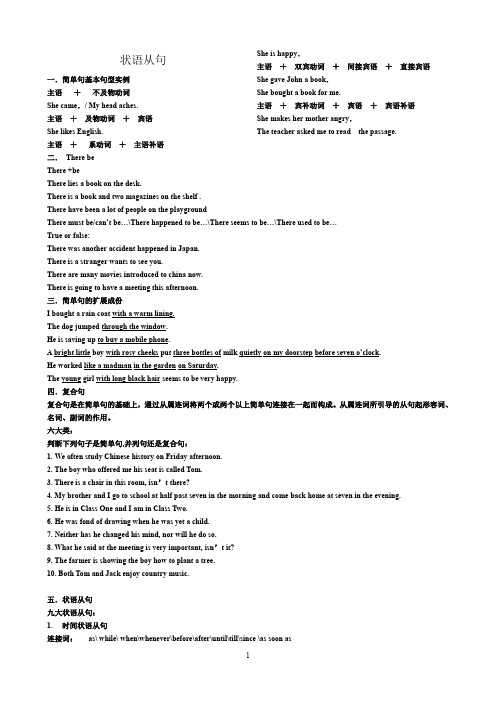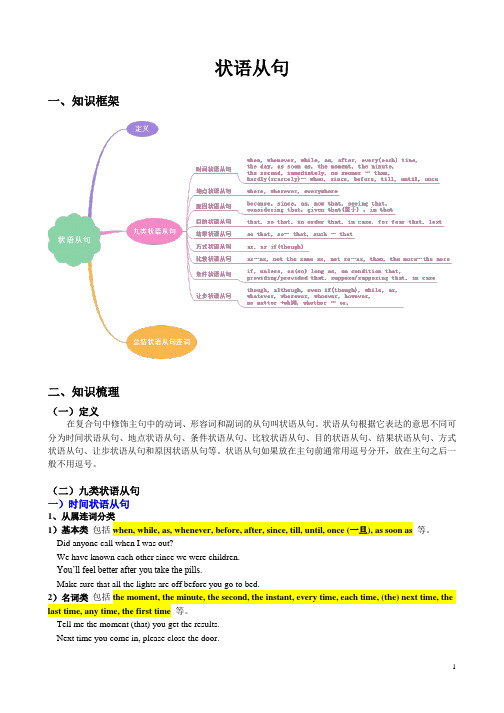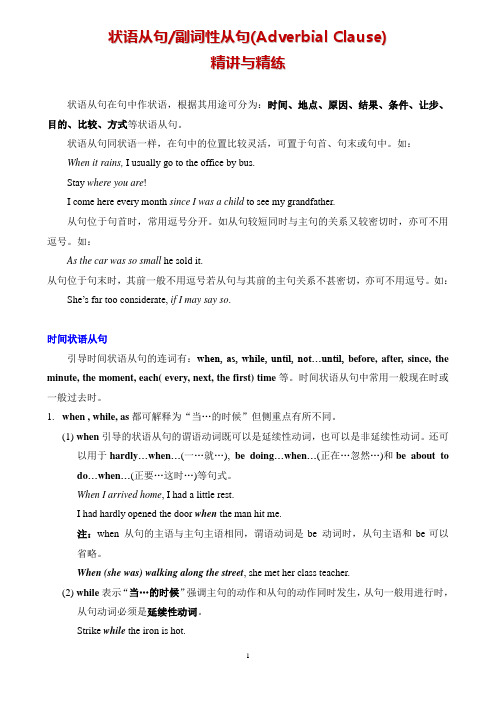状语从句精讲精练
状语从句 精讲精练

状语从句一.简单句基本句型实例主语+不及物动词She came./ My head aches.主语+及物动词+宾语She likes English.主语+系动词+主语补语She is happy.主语+双宾动词+间接宾语+直接宾语She gave John a book.She bought a book for me.主语+宾补动词+宾语+宾语补语She makes her mother angry.The teacher asked me to read the passage.二.There beThere +beThere lies a book on the desk.There is a book and two magazines on the shelf .There have been a lot of people on the playgroundThere must be/can’t be…\There happened to be…\Ther e seems to be…\There used to be…True or false:There was another accident happened in Japan.There is a stranger wants to see you.There are many movies introduced to china now.There is going to have a meeting this afternoon.三.简单句的扩展成份I bought a rain coat with a warm lining.The dog jumped through the window.He is saving up to buy a mobile phone.A bright little boy with rosy cheeks put three bottles of milk quietly on my doorstep before seven o’clock.He worked like a madman in the garden on Saturday.The young girl with long black hair seems to be very happy.四.复合句复合句是在简单句的基础上,通过从属连词将两个或两个以上简单句连接在一起而构成。
状语从句的讲解和练习

状语从句的讲解和练习一、经典讲解在复合句中修饰主句中的动词、形容词或副词等的句子叫状语从句。
状语从句根据它表达的意义的不同可分为:时间状语从句、原因状语从句、条件状语从句、比较方式状语从句、目的状语从句、结果状语从句和让步状语从句。
如果状语从句放在主句前,通常在从句后用逗号隔开。
(一)时间状语从句其连接词有:when,while,before,after,since,till(until),as soon as 等。
由这些连词引导的主从复合句中的主句和从句谓语动词发生的时间有三种情况,即同时发生和先后发生。
因此在运用时间状语从句时,特别要注意主句和从句之间的时态呼应。
1. when引导的从句有时主句的动作和从句的动作同时发生,有时主句的动作在前,从句的动作在后。
如果主句用一般将来时,则从句就要用一般现在时。
Tom will go to see her when he has time.It was raining when I left the hospital.The film had already began when I got to the cinema.2. 由while 引导的从句表示正在进行某一动作时另一动作发生了;还可以表示某个动作还在进行的同时,另一个动作也在进行之中。
例如:While he was reading, the telephone rang.While we were boating on the lake, we saw a fish jump out of the water.While my sister was watching TV, I was writing.While Dad was washing his car, Mum was cooking.3. 由before 引导的从句在由before 引导的从句中,一般来说主句的动作发生在从句的动作之前,主从句的动词都用过去时。
高中英语状语从句详解及习题精练附答案

状语从句一、知识框架二、知识梳理(一)定义在复合句中修饰主句中的动词、形容词和副词的从句叫状语从句。
状语从句根据它表达的意思不同可分为时间状语从句、地点状语从句、条件状语从句、比较状语从句、目的状语从句、结果状语从句、方式状语从句、让步状语从句和原因状语从句等。
状语从句如果放在主句前通常用逗号分开,放在主句之后一般不用逗号。
(二)九类状语从句一)时间状语从句1、从属连词分类1)基本类包括when, while, as, whenever, before, after, since, till, until, once (一旦), as soon as等。
Did anyone call when I was out?We have known each other since we were children.You’ll feel better after you take the pills.Make sure that all the lights are off before you go to bed.2)名词类包括the moment, the minute, the second, the instant, every time, each time, (the) next time, the last time, any time, the first time等。
Tell me the moment (that) you get the results.Next time you come in, please close the door.He felt nervous each time she spoke to him.The last time we talked he said he needed another two days.3)副词类如immediately, directly, instantly, presently等。
状语从句精讲

状语从句精讲状语从句精讲精练在复合句中修饰主句中的动词、形容词或副词,起状语作⽤的从句叫状语从句。
状语从句可置主句之前,也可置主句之后。
前置时,从句后⽤逗号与主句分开;后置时,与主句之间⽆标点符号。
状语从句可分为时间、地点、原因、⽬的、结果、条件、⽐较、让步、⽅式等九类。
⼀、时间状语从句引导时间状语从句的连接词有: when, as, while, after, before, since, ever since, as soon as, once, till, until, whenever, no soone r…than, hardly/scarcely...when, the moment/minute/instant/second, every time, each time, any time, the first time, next time, last time, all the time, by the time, directly, immediately, instantly等。
1. when, while, as引导时间状语从句1) when的⽤法①when既可指时间点,也可指时间段(即:从句动词可以是短暂的也可是延续的);主从句动作可同时也可先后发⽣。
I was thin when I was a child. 当我是个孩⼦的时候,我很瘦。
It was raining when I arrived. 我到达时,天正在下⾬。
②在when引导时间状语从句时,如果从句主语与主句主语相同或为it,且从句有be动词,则从句可省主语和be动词,如:When (you are) in trouble, you can visit this man. 当你有⿇烦时,可以找这个⼈。
She is always listening to music when(she is) doing her homework. 当她做作业时,总是听⾳乐。
高考状语从句考点题型精讲精练(附答案)

状语从句一.时间状语从句考点:1.比较as; when; while用法共同点: 三者都可表示“当……的时候”当as表示“当……的时候”, 往往和通用, 但它着重强调主句与从句的动作或事情同时或几乎同时发生.She came up as I was cooking.The runners started as the gun went off.而when既可以表示在某一点的时候, 又可表示在某一段时间内, 主句与从句的动作或事情可以是同时发生也可以先后发生. 它引导的从句的谓语动词可以是延续性动词; 也可以是短暂性动词.It was raining when we arrived.When we were at school, we went to the library every day.while主句中的动作或事情在从句中的动作或事情的进展过程中发生, 引导的从句中的谓语动词要用延续性动词.My father was watching TV while my mother was cooking.不同用法:as还可表“因为”“随着”As it’s so cold, we won’t go out.As things went on, it turned out that his words were not true.= With things going on, it turned out that his words were not true.“按照”Do as the teachers do.“虽然、尽管、即使”Patient as he was, he had no intention of waiting three hours.when 的其他用法:when = at that time (P高一上158)be about to…whenI was about to leave when the bell rang.be doing…whenWe were doing our homework when the light went out.be going to do …whenI was going to sleep when suddenly someone dropped in.when = ifI will come when I am neededShe will be here to give you help when necessary.既然; 考虑到How can they learn anything when they spend all their spare time watching television ?虽然; 尽管They kept trying when they must have known it was hopeless.Why do you want a new job, ______________you’ve got such a good one already ?A. thatB. whereC. whichD. whenwhile的其他用法---butI like blue, while my brother likes white.= althoughWhile he was a child, he can speak English well.2.比较not…until / untiluntil 用于肯定句强调until后的时间开始时, 主句的动作才结束.I slept until 9:00. (我一直睡到9:00)until 用于否定句强调until后的时间开始时, 主句的动作才开始.I didn’t sleep until 9:00. (我直到9:00才睡)not until 的两种考法:1)not until 在句首, 主句用倒装Not until I began to work did I realize how much time I had wasted.2)It is not until…that…It was not until I began to work that I realized how much time I had wasted.3.before的常见句型和汉泽before 一般译为“在……之前”I’ll come back before they arrive.在不同的语境中意思各异, 可译为“还没来得及……就….”He ran off before I could stop him.The thief disappeared before she could call the police.“一段时间之后才……”It’ll (not) long before….The fire lasted about 4 hours before the firefighters could control it.It was not long before he got the news.4.“一……就”的多种表达:1)on / upon + n./ doingOn arrival, he was told his mother was in hospital.Upon hearing the news, the woman burst into tears.2)directly; immediately; the moment; the minute; as soon as; each time; every time;the first timeHe made for the door directly he heard the knock.3)hardly / scarcely…when; no sooner…thanNo sooner had he arrived than she started complaining.hardly / scarcely 以及no sooner 所在的句子用过去完成时, 并要将had提前. when和than 所在的句子用一般过去时.二.地点状语从句主要的考查点:We will go where the Party directs us.It is built where two rivers come together1) When asked the reason for moving to the USA, Beckham said, “Soccer is huge all around the world apart from America, so that’s _____________I want to make a difference.”A. whereB. whyC. whatD. how2) Staying ______________ you are means you will fail behind others.A. at the placeB. whenC. whereD. there3) You should made it a rule to leave things ____________ you can find them again.A. whenB. whereC. thenD. there4) I have kept the picture __________ I can see it every day as it always reminds me of my happy days in Paris.A. thatB. whenC. whereD. on which三.原因状语从句区别: because; as ; since; for1)表有因果关系的原因时用because, because从句最重要的部分, 通常它被置于主句之后.You want to know why I’m leaving. I’m leaving because I’m full.2)for 是并列连词, 表示对前面主句的内容加以解释或推断, 其语气较because 要弱得多,是可说可不说的话, 它只能置于主句之后. 如: It’s morning now, for the birds are singing.(很显然, 鸟叫不可能是“现在已是早上”的原因)3)表示已经知道的原因时用as 或since, 即某种原因在说话人很重要的部分. since 要比as正式一些, 它们通常被置于主句之前, 但有时却相反. Seeing all of the children already seated, he said, “Since everyone is here, let’s start.”4)下列情况下只能使用because ; ①在回答why 的问句时; ②在用于强调句型时; ③被not所否定时.四.条件状语从句主要考查主将从现We’ll start our project if the manager agrees.You will certainly succeed so long as you keep on trying.五.目的、结果状语从句so…that 和such… that的用法区别so+adj./adv.+ that 和such (+adj) + n. + that都表示结果. 如:The weather is so nice that we all want to go out.It’s such nice weather that we all want to go out.因为so 为副词, 可接形容词或副词, 而such为形容词, 只能接名词such +a + adj.+ n. 可用so +adj. +a+n.代替. 如:such a good man= so good a man在表数量的much; many; little; few 前要用so 而不用such. 如:There was so much dust that we couldn’t see what was happening.六.让步状语从句考点:1)由“疑问词+ever”或由“no matter+疑问词”引导的从句Whatever he says, don’t go. ( = No matter what he says, don’t go.)no matter 常用作连词,引导状语从句,“不管;无论”,后接what/ who/ when/ where/ how 等疑问词。
状语从句精讲与精练

状语从句/副词性从句(A d v e r b i a l C l a u s e)精讲与精练状语从句在句中作状语,根据其用途可分为:时间、地点、原因、结果、条件、让步、目的、比较、方式等状语从句。
状语从句同状语一样,在句中的位置比较灵活,可置于句首、句末或句中。
如:When it rains, I usually go to the office by bus.Stay where you are!I come here every month since I was a child to see my grandfather.从句位于句首时,常用逗号分开。
如从句较短同时与主句的关系又较密切时,亦可不用逗号。
如:As the car was so small he sold it.从句位于句末时,其前一般不用逗号若从句与其前的主句关系不甚密切,亦可不用逗号。
如:She’s far too considerate, if I may say so.时间状语从句引导时间状语从句的连词有:when, as, while, until, not…until, before, after, since, the minute, the moment, each( every, next, the first) time等。
时间状语从句中常用一般现在时或一般过去时。
1.when , while, as都可解释为“当…的时候”但侧重点有所不同。
(1) when引导的状语从句的谓语动词既可以是延续性动词,也可以是非延续性动词。
还可以用于hardly…when…(一…就…), be doing…when…(正在…忽然…)和be about to do…when…(正要…这时…)等句式。
When I arrived home, I had a little rest.I had hardly opened the door when the man hit me.注:when 从句的主语与主句主语相同,谓语动词是be 动词时,从句主语和be可以省略。
初中英语状语从句详细讲解与练习(精华版)

对比训练 1
1. __A__ he heard this, he got very angry.
2. I met Lucy__B__ I was walking along the river.
3. __C__ a child, he lived in the countryside. A. when B. while C. as
4. 表示“随着…..”.常指一个行为是另一个行为的结果。 As she grew older, she became more beautiful.
while:持续性动词 /进行时
1.一般或现在情况
e.g. I like listening to music while I am doing my homework 2.将来. 情况-V一般现在时或现在进行时 e.g.— I’m going to the post office.
won in the end.
A. After B. before C. when D. then
since引导的时间状语从句
1.常译为“自从……”, 2.主句常用现在完成时,从句常用一般过去时。
1.我们自从分手以后一直没见过面。 We haven’t seen each other since we parted. 常用句型:It has been (is) + 时间段 + since从句
-- While you are there, can you get some stamps for me?
3.过去情况
e.g. I hurt my should while I was doing gym.
When: 1.当…的时候 When I was young, I went to town myself. When he receives the letter, he’ll tell us.
(完整)高中英语状语从句讲解及练习

状语从句2.在复合句中作状语,位置灵活。
3.状语从句可分为时间状语从句,目的状语从句,条件状语从句,让步状语从句,地点状语从句,原因状语从句,方式状语从句,结果状语从句。
4.〔一〕时间状语从句5. 1. when,as,while6. a. when表时间,从句既可以用延续性动词,又可以用瞬间动词。
7.Eg:WhenIgetthereIwillcallyou.8.如果when引导的时状的主语与主句的主语相同,而从句的谓语又是 be动词时,那么从句中的主语与b e9.可省。
10.Eg:When〔youare〕introuble,youcanaskherforhelp.11.如果when引导的时状的主语与主句的主语相同时,往往可以用“when+分词〞的形式代替该状从。
12.Eg:WhenIcameintotheroom(Whencomingintotheroom),Ifoundthelightwasoff.13.while表时间,从句需用延续性动词,或者主句的动作发生在从句的动作进行过程中。
主句的谓语动词通常是非延续性动词。
14.Eg:HecameinwhileIwasreadingabook.15.ImetherwhileIwasinschool.16. c.as表时间,与when相似,但侧重强调主从句动作同在时间点或同时间段进行。
同时可表示主句的动作随着从句的动作的变化而变化。
17.Eg:Hejumpsashesings.18.Asthewindrose,thenoiseincreased.19.before(在之前)与after〔在之后〕Eg:Seemebeforeyouleave.20.IsawthemafterIarrived.21.till与until肯定形式表示的意思是"做某事直至某时 "。
否认形式表达的意思是 "直至某时才做某事 "。
Eg:Waittill/untillIcallyou.等着直到我叫你。
- 1、下载文档前请自行甄别文档内容的完整性,平台不提供额外的编辑、内容补充、找答案等附加服务。
- 2、"仅部分预览"的文档,不可在线预览部分如存在完整性等问题,可反馈申请退款(可完整预览的文档不适用该条件!)。
- 3、如文档侵犯您的权益,请联系客服反馈,我们会尽快为您处理(人工客服工作时间:9:00-18:30)。
No sooner had we arrived at the station than the train left. 我们刚到车站,火车就离站了。
工具
语法专项提升
栏目导引
while表示“虽然,尽管”之意。 While travel can broaden your mind,I don’t think it’s a good idea to spend too much time and money on it. 尽管旅游能够增长见识,但是我认为你不应该在这方面 花费太多的时间和金钱。
工具
语法专项提升
栏目导引
We were about to set off when it suddenly began to rain. 我们刚要出发,突然下起雨来。 We were having a meeting when someone broke in. 我们正开着会突然有人闯入。 He had just fallen asleep when the phone rang. 他刚刚睡着电话就响了。
In case anything important happens,please call me up. 万一发生了什么重要事情,请打电话给我。 My parents don’t mind what job I do as long as I am happy. 我父母不在乎我从事什么样的工作,只要我高兴就好。 The medicine works more effectively if you drink some hot water after taking it. 这种药如果你热水送服,会更加有效。
工具
语法专项提升
栏目导引
1.(2012·合肥市第一次教学质量检测)Mrs Black had such a
wonderful time she visited her friends in Sydney last year.
A.when
B.that
C.which
D.as
解析: 考查连词用法。句意:布莱克夫人去年在悉尼
B.Since
C.If
D.Though
解析: 考查状语从句。句意:除非天气恶劣,否则我
每天都到户外进行锻炼。unless如果不……除非……,符合句
意。
答案: A
工具
语法专项提升
栏目导引
2.(2012·潍坊市高考模拟)My students,
you have a
heart loving life,you always can find things that would make you
那个迷路的小女孩决定待在原地等她母亲。 Keep in touch with your family members wherever you are in the world.不管你在世界上的什么地方,都要跟家人保持联 系。
工具
语法专项提升
栏目导引
2.地点状语从句在句首时常兼有抽象条件意味。 Where there’s a will,there’s a way. 有志者事竟成。 Where(ver) there’s plenty of sun and rain,the fields are green. 哪里阳光雨水充足,哪里的田野就绿油油。
Supposing it rains tomorrow,what shall we do? 假设明天下雨我们做什么?
工具
语法专项提升
栏目导引
1.(2012·郑州第一次质量预测)
bad weather stops
me,I take exercise outdoors every morning.
A.Unless
工具
语法专项提升
栏目导引
2.before (1) 若表 示 “ 还 未 …… 就 …… ; 不 到 …… 就 …… ; …… 才 …… ; 趁 …… ;还 没 来 得及 …… 就 ……” 时 , 需 用 连 词 before。 He rushed out of the room before I told him the news. 我还没来得及告诉他消息,他就冲出了房间。 Please write it down before you forget it. 趁你现在没忘把它记下来。
工具
语法专项提升
栏目导引
(2)It will be+一段时间+before...多久之后才…… The UN officials say it could be many weeks and even months before a deal is reached. 在协议达成之前还需要许多星期甚至几个月。
一些书阅读以防无聊。A.好像,似乎;B.以便;C.以防万一;
D.尽管,虽然。根据语意可知C项正确。
答案: C
工具
语法专项提升
栏目导引Байду номын сангаас
1.通常由连词where和wherever 引导,从句可位于主句之 前,也可位于主句之后。
(2009年山东卷)The little girl who got lost decided to remain where she was and wait for her mother.
工具
语法专项提升
栏目导引
1 . (2012· 潍 坊 市 高 考 模 拟 )There she was , standing
exactly I had left her,crying bitterly.
A.when
B.that
C.where
D.in which
解析: 考查状语从句。她就站在我刚才离开她的那个
1.由although,though,as 引导的状语从句although 和 though 同义,用法基本相同。前者较正式,多置于句首;后 者较通俗、口语化。
Although the police thought he was the most likely one, since they had no exact proof about it,they would not arrest him.
point was left out.
A.when
B.in which
C.how
D.where
解析: 考查状语从句。句意为:这位新老师条理非常
清楚,她从我们昨天停止的地方开始,没有遗漏要点。where
we stopped yesterday是状语从句。
答案: D
工具
语法专项提升
栏目导引
3.(2012·龙岩检测)My mother likes everything in order,
工具
语法专项提升
栏目导引
2 . 由 on condition(that) ; provided(that) ; providing (that)(假若;倘使);supposing(that)等引导的条件状语从句。
You can go swimming on condition that you don’t go too far from the river bank.只有不离河岸太远你才能下去游泳。
and she always reminds us to put things back
we get them
from.
A.so that
B.in which
C.once
D.where
解析: 考查状语从句。where we get them from是地点状
语从句。
答案: D
工具
语法专项提升
栏目导引
工具
语法专项提升
栏目导引
3.引导时间状语从句的连词有when,whenever,while, as,each time,as soon as,no sooner...than,hardly...when,the second,immediately等。
Just use this room for the time being,and we’ll offer you a larger one as soon as it becomes available.
是“一……就……”。
答案: D
工具
语法专项提升
栏目导引
3.(2012·河南质量调研)Having checked everything,he
sat down to do his homework,
he heard a lightening strike
the electricity pole in the backyard.
(你)暂时先用这个房间吧。一有更大的房间的话,我们就 会为你安排的。
工具
语法专项提升
栏目导引
Jerry rushed home immediately he heard the news,only to find that his house had been burnt down and all the furniture burnt out.
看 望 她 的 朋 友 时 过 得 很 愉 快 。 “ she visited her friends in
Sydney last year”是when引导的时间状语从句。
答案: A
工具
语法专项提升
栏目导引
2 . (2011· 杭 州 第 二 次 质 量 检 测 )The headmaster has
答案: A
工具
语法专项提升
栏目导引
3.(2012·山东省四市联考)I usually take something to read
